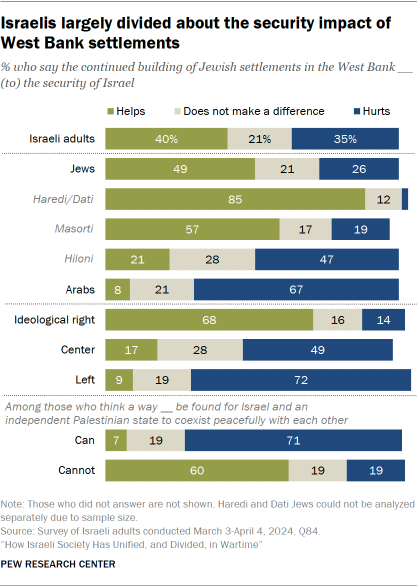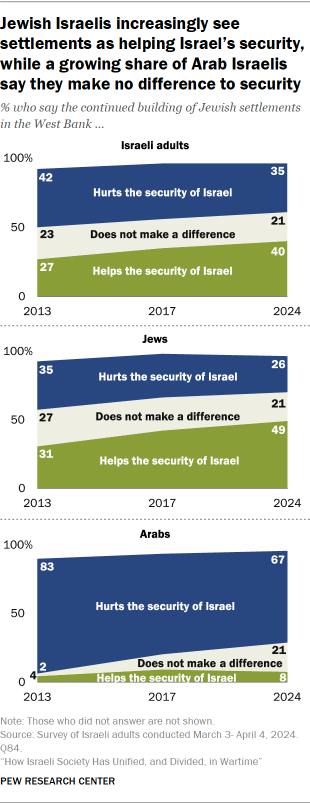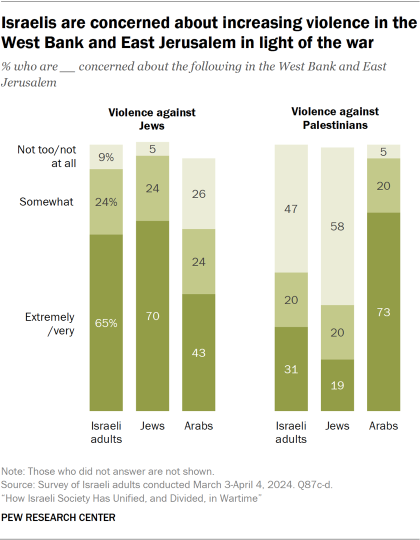Though the war against Hamas has been taking place in Gaza, violence has also increased in the West Bank, according to the United Nations. Israelis are broadly concerned about this: 65% say they are extremely or very concerned about increasing violence against Jews in the West Bank and East Jerusalem, and 31% say the same about violence against Arabs. But Jewish and Arab Israelis differ over which group is the focus of their concern.
When it comes to Jewish settlements in the West Bank, 40% of the public say they help Israeli national security, while 35% say they hurt. An additional 21% think settlements don’t make much difference to the country’s security.
Israelis divided over whether Jewish settlements in the West Bank help or hurt Israeli security

Israel has continued to plan for new West Bank settlements in recent months – a move that prompted the Biden administration to declare in February that these settlements are “illegitimate” under international law, citing a 50-year-old U.S. State Department opinion.
Israelis are divided on the effect of continuing to construct settlements in the West Bank: 40% say they help Israeli security, 35% say they hurt, and 21% say they don’t make a difference. (The remainder are unsure or decline to answer.)
Jewish Israelis are much more likely than Arab Israelis to view settlements as helping the country’s security (49% vs. 8%). Indeed, two-thirds of Israeli Arabs say these settlements hurt Israeli security – a position also taken by 26% of Israeli Jews.
Highly religious Jews in Israel tend to think that settlements contribute to the country’s security, but secular Jews are more likely to say settlements hurt security. Among self-identified Haredim (“ultra-Orthodox” Jews) and Datiim (“religious” Jews), 85% say that the continued building of settlements helps Israeli security, and 57% of Masortim (“traditional” Jews) agree.

Among Hilonim (“secular” Jews), just 21% say settlements help security, while a 47% plurality view settlements as harmful in this regard. Both Masortim and Hilonim are less likely to offer opinions on this question than Haredim or Datiim.
Israeli adults who place themselves on the ideological right are particularly likely to view settlements as helping Israel’s security (68%), while those in the center (17%) and on the left (9%) are much less likely to share this viewpoint. Among those on the left, about seven-in-ten say the continued building of Jewish settlements in the West Bank hurts Israeli security.
People who think that Israel and an independent Palestinian state can coexist peacefully are particularly likely to say that settlements hurt Israeli security (71%). Those who doubt that a way can be found for two states to coexist peacefully are much more inclined to see settlements as helping Israeli security (60%).
Among the Israeli public overall, the view that settlements enhance security has increased 13 points since we first asked this question in 2013. Over that same 11-year period, the share of Israeli Jews who think building settlements helps Israel’s security has steadily grown. The share of Israeli Arabs who agree has fluctuated a bit but has consistently stayed under 10%.
Violence in the West Bank and East Jerusalem

Since Oct. 7, there have been myriad reports of violence against Palestinians in the West Bank, with some of these events resulting in sanctions by the U.S. government against individual settlers accused of committing attacks. And according to an Israeli human rights group and Human Rights Watch, rates of violence and death in the West Bank are at a historic high.
There also have been reports of violence against Jewish settlers in the West Bank, and more Israelis say they are extremely or very concerned about rising violence against Jews (65%) than against Palestinians (31%) in the West Bank and East Jerusalem.
However, Israeli Jews and Israeli Arabs differ sharply in their assessments:
- Jewish Israelis are much more likely than Arab Israelis to express concern about rising violence against Jews in the West Bank and East Jerusalem (70% vs. 43%), though Arab Israelis are less likely to offer an opinion on this question.
- Arab Israelis are much more likely than Jewish Israelis to express concern about rising violence against Palestinians in these areas (73% vs. 19%).
There are also ideological differences, with left-leaning Israelis 43 points more likely than right-leaning Israelis to voice concern about violence against Palestinians – and 20 points less likely to voice concerns about violence against Jews.
Survey respondents who say Jewish settlements help Israeli security are significantly more concerned about rising violence against Jews when compared with those who think settlements hurt security (75% vs. 56%). But those who see settlements as helping security are less concerned about violence against Palestinians in the West Bank and East Jerusalem than those who say they hurt security (16% vs. 54%).
Israelis were also asked about their concerns about the war going on for a long time and expanding into other countries. Read more about these concerns in our previously published report, “Israeli Views of the Israel-Hamas War.”
CORRECTION (August 8, 2024): This report, including graphics, has been updated to reflect that a survey question asked about violence against Palestinians in the West Bank and East Jerusalem, not violence against Arabs (as was previously reported). Also, a question about the ability of religious and secular people to live together peacefully asked about religious and secular Jews, not Israelis.




